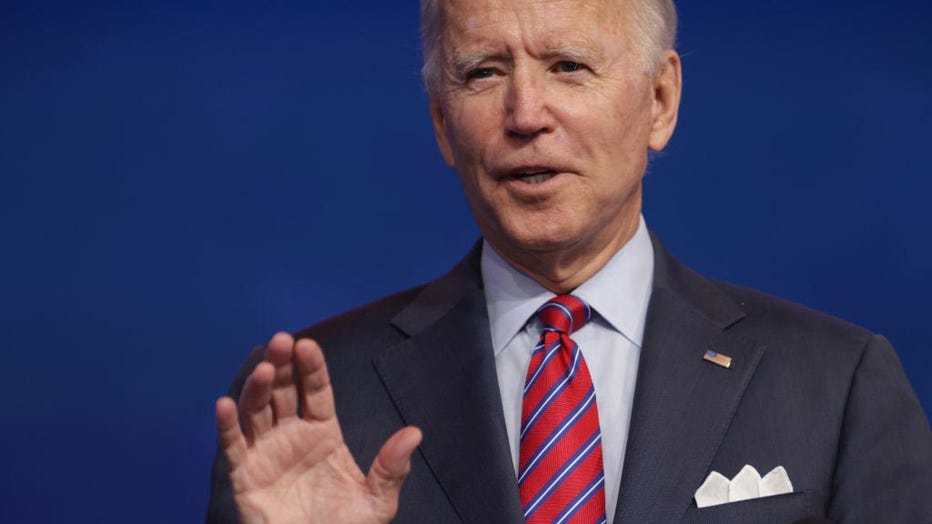Safe harbor deadline locks Congress into accepting Joe Biden's win
WASHINGTON - There are many dates to be aware of between Election Day and Inauguration Day — one of them being the “safe harbor” deadline on Dec. 8, 2020.
Every state except Wisconsin appears to have met the safe harbor deadline, according to the Associated Press — a key date further cementing President-elect Joe Biden’s future in the White House.
The deadline in federal law (3 U.S. Code § 5) frees a state from further challenges if it settles legal disputes and certifies its results at least six days before the Electoral College meets to cast votes, which this year falls on Dec. 14.
RELATED: What happens at the Electoral College meeting?
Those votes will then be sent to the Capitol for counting on Jan. 6, electing Biden as the country's 46th president.
Biden has officially secured more than the 270 Electoral College votes needed to win the White House. By the end of the day, every state is expected to have made its election results official, awarding 306 electoral votes to Biden and 232 to President Donald Trump, according to the Associated Press.

President-elect Joe Biden speaks on November job numbers at the Queen theater on Dec. 4, 2020 Wilmington, Delaware. (Photo by Alex Wong/Getty Images)
“Whatever final decision that state reached by (Dec. 8) — that’s conclusive and final and binding and nobody has any right to second guess it,” explained Adav Noti of Campaign Legal Center, a nonpartisan, nonprofit organization that focuses on voting rights, campaign finance, anti-gerrymandering work and government ethics.
Noti is the center’s senior director for trial litigation and chief of staff. He previously spent more than 10 years with the Federal Election Commission in a variety of capacities.
“It’s not a deadline in the sense that states don’t have to do that — states have until Dec. 14 to figure out who their members of the Electoral College are,” Noti added. “But if they do it at least six days in advance, they have this extra protection under federal law.”
RELATED: Safe harbor deadline: Here’s why Dec. 8 matters in the 2020 election
The attention paid to the normally obscure safe harbor provision is a function of Trump's unrelenting efforts to challenge the legitimacy of the 2020 U.S. election. He has refused to concede, made claims without evidence of fraud and called on Republican lawmakers in key states to appoint electors who would vote for him even after those states have certified a Biden win.
But Trump's arguments have gone nowhere in courts in Arizona, Georgia, Michigan, Nevada, Pennsylvania and Wisconsin. Most of his campaign's lawsuits in state courts challenging those Biden victories have been dismissed, with the exception of Wisconsin, where a hearing is scheduled for later this week.
Like the others, the lawsuit does not appear to have much chance of succeeding, but because it was filed in accordance with state law procedures for challenging election results, “it's looking to me like Wisconsin is going to miss the safe harbor deadline because of that,” said Edward Foley, a professor of election law at Ohio State University's Moritz School of Law.
Judge Stephen Simanek, appointed to hear the case, has acknowledged that the case would push the state outside the electoral vote safe harbor.
Missing the deadline won't deprive Wisconsin of its 10 electoral votes. Biden electors still will meet in Madison on Dec. 14 to cast their votes and there's no reason to expect that Congress won't accept them. In any case, Biden would still have more than the 270 votes he needs even without Wisconsin's.
But lawmakers in Washington could theoretically second-guess the slate of electors from any state that misses the Dec. 8 deadline, Foley added.
Already one member of the House of Representatives, Rep. Mo Brooks, R-Ala., has said he will challenge electoral votes for Biden on Jan. 6. Brooks would need to object in writing and be joined by at least one senator. If that were to happen, both chambers would debate the objections and vote on whether to sustain them.
But unless both houses agreed to the objections, they would fail.
The safe harbor provision played a prominent role in the Bush v. Gore case after the 2000 presidential election. The Supreme Court shut down Florida’s state-court-ordered recount because the safe-harbor deadline was approaching. The court's opinion was issued Dec. 12, the deadline in 2000.
Vice President Al Gore conceded the race to George W. Bush, then the Texas governor, the next day.
In his dissent, Justice Stephen Breyer said the deadline that really mattered was the day on which the Electoral College was scheduled to meet. Whether there was time to conduct a recount by then “is a matter for the state courts to determine,” Breyer wrote.
When Florida's electoral votes, decisive in George W. Bush's victory, reached Congress, several Black House members protested, but no senators joined in. It was left to Gore, who presided over the count as president of the Senate, to gavel down the objections from his fellow Democrats.
This story was reported from Cincinnati. The Associated Press contributed.

